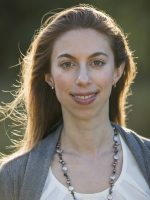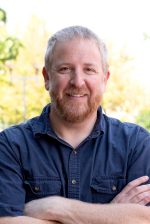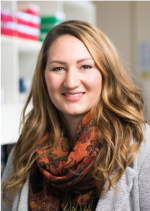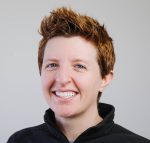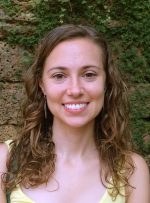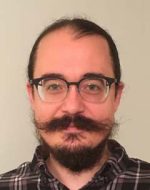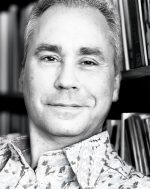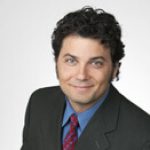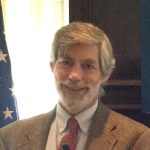Penn State undergrads interview research scientists forging new pathways to understanding human evolution. A production of Penn State’s Center for Human Evolution and Diversity.
Episodes produced by Cole Hons.
Sat, 27 Apr 2024 17:00:00 -0400 ◦ 29 minutes
Penn State undergrad Thomas Sontag interviews associate professor of anthropology Laura Weyrich about her research on the history of our microbiomes and explains why it holds relevance to contemporary medicine.
Thomas Sontag
Undergraduate student at Penn State double majoring in Microbiology and German
Laura Weyrich
Associate Professor of Anthropology at Penn State
Mon, 08 Apr 2024 11:00:00 -0400 ◦ 26 minutes
Penn State undergrad Emma Sieminski interviews Biology and Entomology professor, former Director of the Huck Institutes of the Life Sciences, and current Senior VP of Research, Andrew Read about his research on the ecology and evolution of infectious disease.
Emma Sieminski
Undergraduate student at Penn State majoring in Forensic Science
Andrew Read
Evan Pugh Professor of Biology and Entomology, Senior Vice President of Research at Penn State
Sun, 07 Jan 2024 16:00:00 -0500 ◦ 39 minutes
Penn State undergrad Thomas Sontag interviews associate professor Asher Rosinger about his research, which explores how people in different parts of the world meet their water needs.
Thomas Sontag
Undergraduate student at Penn State double majoring in Microbiology and German
Asher Rosinger
Associate Professor of Biobehavioral Health at Penn State
Tue, 31 Oct 2023 08:00:00 -0400 ◦ 33 minutes
Penn State undergrad Emma Sieminski interviews professor Jennifer Wagner about her research at the interface of emerging science and law.
Emma Sieminski
Undergraduate student at Penn State majoring in Forensic Science
Jennifer Wagner
Assistant Professor of Law, Policy and Engineering at Penn State
Sat, 30 Sep 2023 21:00:00 -0400 ◦ 32 MINUTES
Penn State undergraduate Tom Sontag interviews professor Seth Bordenstein about his pioneering research in the burgeoning field of microbiomes
Thomas Sontag
Undergraduate student at Penn State double majoring in Microbiology and German
Seth Bordenstein
Professor of Biology and Entomology, Huck Chair in Microbiome Sciences, and director of the One Health Microbiome Center at Penn State
Sun, 25 Jun 2023 09:00:00 -0400 ◦ 39 minutes
Penn State undergraduate Kassi Bradburn interviews professor David Almeida about his novel, decades-long research into the role daily stressors play in the lives of people across the lifespan.
Kassi Bradburn
Undergraduate student at Penn State, double majoring in Forensic Science and Biobehavioral Health with a minor in Chemistry
David Almeida
Professor of Human Development and Family Studies at Penn State
SAT, 04 MAR 2023 16:00:00 -0500 ◦ 40 MINUTES
Penn State undergraduate Hannah Marchok interviews professor Pete Hatemi about his pioneering, interdisciplinary research investigations into the role narcissism plays in contemporary American politics.
Hannah Marchok
Undergraduate Biobehavioral Health student at Penn State with a minor in Global Health.
Pete Hatemi
Distinguished Professor of Political Science, Microbiology and Biochemistry at Penn State.
MON, 29 JAN 2022 ◦ 29 MINUTES
Penn State undergraduate Alexis Capel interviews professor Jenae Neiderhiser about her long-term, interdisciplinary research investigations into the interplay between genetic and environmental factors that shape the personalities of children as they grow into adolescence. By focusing on the development of adopted children and twins raised in different situations, Dr. Neiderhiser (an adopted person herself) is able to observe how these different factors play out.
Alexis Capel
Undergraduate Biological Anthropology student at Penn State.
Jenae Neiderhiser
Distinguished Professor of Psychology and Human Development and Family Studies at Penn State.
MON, 28 NOV 2022 22:00:00 -0500 ◦ 40 MINUTES
Penn State undergraduate Kassi Bradburn interviews assistant professor of biology Emily Davenport about her unique approach to researching the complex relationship that human beings have with our microbiomes. Her lab uses high-throughput sequencing technologies and novel computational and statistical techniques to approach this material from a genomic perspective.
HOST:
Kassie Bradburn, Penn State undergraduate student double majoring in Forensic Science – Biology Option and Biobehavioral Health with a minor in Chemistry.
GUEST:
Emily Davenport, Assistant Professor of Biology at Penn State working to understand the complex relationship humans have with our microbiomes. Her lab uses
MON, 10 OCT 2022 13:00:00 -0400 ◦ 38 MINUTES
Penn State undergraduate Hannah Marchok interviews postdoctoral researcher Dr. Tina Lasisi about her her efforts to fill in gaps in our understanding of human hair morphology, as well as possible explanations for the evolution of different hair types, and the importance of approaching biological anthropology from a more inclusive standpoint.
HOST:
Hannah Marchock, Penn State undergraduate student majoring in Biobehavioral Health with a minor in Global Health
GUEST:
Dr. Tina Lasisi, postdoctoral researcher, University of Southern California
MON, 22 AUG 2022 08:00:00 -0400 ◦ 36 MINUTES
Penn State undergraduate Alexis Capel interviews Dr. David Plutzer, Professor of Political Science and Sociology, about his continuing research on the teaching of evolution and climate change in public schools across the United States.
HOST:
Alexis Capel, Penn State Undergraduate Student, Biological Anthropology
GUEST:
Dr. David Plutzer, Penn State Professor of Political Science and Sociology
MON, 04 OCT 2021 06:00:00 -0400 ◦ 30 MINUTES
Penn State undergraduate Samantha Muller interviews Dr. David Puts, Professor of Anthropology about his research. Puts’ Behavioral Endocrinology and Evolution Lab focuses on the evolutionary and neuroendocrine bases of human sexuality and sex differences.
HOST:
Samantha Muller, Penn State Undergraduate Student, Forensic Science, minor in Anthropology
GUEST:
Dr. David Puts, Professor of Anthropology
MON, 27 SEP 2021 06:00:00 -0400 ◦ 21 MINUTES
Recent Penn State graduate Amy Mook interviews Dr. Marta Tomaszkiewicz, Assistant Research Professor of Biology about her innovative research on male infertility. Marta is particularly interested in understanding the potential of using RNA information and RNA-based technologies to answer important biological questions. She is currently testing the hypothesis that variation in ampliconic gene expression can explain differences in semen characteristics between fertile and infertile men. Her work can be followed at: https://twitter.com/amplicomics
HOST:
Amy Mook, Penn State Alum, Genetics and Developmental Biology
GUEST:
Dr. Marta Tomaszkiewicz, Assistant Research Professor of Biology
SUN, 19 SEP 2021 06:00:00 -0400 ◦ 26 MINUTES
Penn State undergraduate student Samantha Muller interviews Postdoctoral Fellow in Physiology Tony Wolf about his research on variance in cardiovascular responses to thermal stressors. Tony is particularly interested in understanding the various factors underlying population disparities in cardiovascular function that lead to increased risk of cardiovascular morbidity and mortality. Among these factors are skin pigmentation and socioeconomic background.
HOST:
Samantha Muller, Penn State undergraduate student in Forensic Science, with a minor in Anthropology; member of the MicroARCH Lab
GUEST:
Dr. S. Tony Wolf, Postdoctoral Fellow, Penn State Physiology
MON, 13 SEP 2021 06:00:00 -0400 ◦ 30 MINUTES
Penn State undergraduate student Hannah Marchok interviews Assistant Professor of Geography, African Studies, and Anthropology Bronwen Powell about her research into factors that may drive dietary practices across different groups of people in different regions of East Africa. Powell also shares her passion for wild foods, international collaborations, and inter-disciplinary approaches to dietary behavior change.
HOST:
Hannah Marchok, Penn State Biobehavioral Health, with a minor in Global Health; member of the Shriver Lab hair team
GUEST:
Dr. Bronwen Powell, Assistant Professor of Geography, African Studies, and Anthropology
TUE, 07 SEP 2021 06:00:00 -0400 ◦ 25 MINUTES
Penn State undergraduate student Samantha Muller interviews PhD student Natalia Grube about her research exploring the potential of the tapeworm as a proxy to more accurately pinpoint humanity’s adoption of meat eating and cooking with fire. Their conversation also covers Natalia’s passion for youth outreach, the importance of diverse collaborations, and strategies to improve scientific literacy nationally.
HOST:
Samantha Muller, Penn State Forensic Science undergrad, with a minor in Anthropology; member of the microARCH Lab
GUEST:
Natalia Grube, Penn State graduate student in Biology, member of the Anthropological Lab
MON, 30 AUG 2021 06:00:00 -0400 ◦ 42 MINUTES
Recent Penn State graduate Amy Mook interviews Nina Jablonski about her ground-breaking research into the evolution of skin pigmentation, and the promise of that research to help to heal the damage inflicted over generations through misguided racist constructs perpetuated by the scientific establishment of the past.
HOST:
Amy Mook, 2020 graduate of Penn State’s Genetics and Developmental Biology program
GUESTS:
Dr. Nina Jablonski, Evan Pugh Professor of Anthropology, Penn State
Co-director of the Center for Human Evolution and Diversity
MON, 23 AUG 2021 06:00:00 -0400 ◦ 38 MINUTES
Undergraduate student Hannah Marchok interviews Dr. Mark Shriver about his work tracking down what he calls “superficial” physical traits that distinguish people from one another – and about his life as a research scientist.
Host:
Hannah Marchok, Penn State Biobehavioral Health major, minoring in Global Health
Guest:
Dr. Mark Shriver, Professor of Biological Anthropology, Penn State University
Co-director of the Center for Human Evolution and Diversity
MON, 16 AUG 2021 06:00:00 -0400 ◦ 27 MINUTES
In this debut episode, the co-directors of Penn State’s Center for Human Evolution and Diversity (CHED) are interviewed by Amy Mook, a recent graduate of the university, about the origins and mission of their Center – and this podcast.
HOST:
Amy Mook, 2020 graduate of Penn State’s Genetics and Developmental Biology program
GUESTS:
Nina Jablonski, Evan Pugh Professor of Anthropology, Penn State
Mark Shriver, Professor of Anthropology, Penn State

